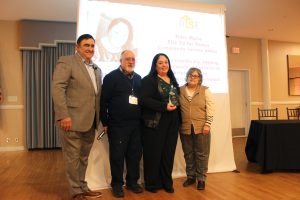In a summit meant to find solutions to rising numbers of homeless people in the region, one of the most emotional moments came when a long-time, well-respected advocate stood up before the crowd of more than 100 and said she’d recently become homeless.
The declaration sent ripples of shock through the audience.
And she wasn’t the only one. Asked who in the room had experienced homelessness, nearly a dozen professionals stood up.
The Bristol County Continuum Summit on Homelessness was held Nov. 22 at White’s of Westport to help resolve the lack of housing available, bringing together federal, state and local officials, economists, housing experts, advocates and social service providers from agencies and organizations throughout southeastern Massachusetts.
Most in attendance knew someone who needed housing and for many, the increasing inability to help those without homes had become personally painful.
The morning’s first speaker, Michael Goodman, executive director of Economic and Community Partnerships and professor of policy at the University of Massachusetts Dartmouth, laid out the long-standing issues behind the housing problem.
Goodman painted a complex picture of the region’s current aging housing stock, rising costs, and how housing production has not kept pace with need over several decades.
The pace of housing development is changing, he said, but not fast enough to keep up with population growth, even as that growth has slowed.
“I do want to acknowledge that in recent years, particularly in our two cities (of Fall River and New Bedford) that the trend has started see more development, greater attention to the problem and some more production in the pipeline,” Goodman said. “But I think we’ve got a whole lot more work to do in order to balance the housing market in our region.
When production does not keep up with demand, Goodman added, then competition for existing units grows and prices rise.
“And this is precisely what we’ve seen in Massachusetts and in southeastern Massachusetts and on the South Coast,” he said.
“Part of the challenge here isn’t just the prices,” Goodman continued. “When people say the rent is too damn high, I say yes, that’s exactly right. But the incomes are also too low here for as long as we’ve been measuring that.”
Goodman described some of the problems behind creating new housing including the subsidies needed to make up the gap between the costs of development and the rents that lower regional income levels allow.
“We need to do everything that we can do to catch up as quickly as possible if we’re determined to address the underlying causes of the problems that bring us together in this room here today,” he said.
Attendees also heard from federal, state and local housing officials about the programs that currently exist to support those without homes and new programs being developed.
The summit was the effort of the Bristol County Continuum of Care which was created through the 2024 merger of the New Bedford Homelessness Providers Network and the Greater Bristol County Attleboro Taunton “GBCATCH.”
The BCCC meets regularly to address pressing issues around the complexity of homelessness and works toward ensuring every individual and every family has access to appropriate, sustainable safe, decent and affordable housing, according to its website description.
At the event, longtime homelessness advocate and member of Rise Up for Homes, Leslie Poulin, was recognized with the first Rise Up for Homes Community Service Award for extraordinary ongoing commitment and service to helping people experiencing homelessness.
The award was named for the late Peter Muise, who was a committed advocate to ending homelessness in his role as CEO of First Citizen’s Federal Credit Union. It was presented to Poulin by Muise’s widow, Robin Muise, and announced by Rev. David Lima.
“From Rise Up For Homes conception to its implementation, Leslie has been the support, the convener, the scheduler and the planner that made it all happen,” Lima said about Poulin. “A true compassionate leader, caring about the unhoused, she worked with Peter Muise and has been a close family friend, giving this award extra special meaning.”

Recent Comments